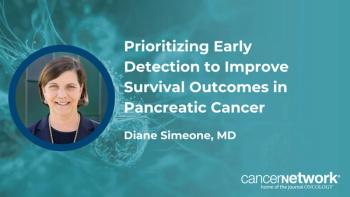
Top Highlights From the 2015 Society of Gynecologic Oncology Annual Meeting
This slide show features some of the top highlights from the 2015 Society of Gynecologic Oncology Annual Meeting, including a vaccine trial in ovarian cancer and a possible biomarker in advanced cervical cancer.
References:
1. Oh J, Barve M, Grosen EA, et al. Randomized phase II trial of maintenance autologous tumor cell vaccine (FANG™) following clinical complete response (cCR) in stage III/IV ovarian cancer: Preliminary results. 2015 Society of Gynecologic Oncology Annual Meeting.
2. Coleman RL, Brady MF, Herzog TJ, et al. A phase III randomized controlled clinical trial of carboplatin and paclitaxel alone or in combination with bevacizumab followed by bevacizumab and secondary cytoreductive surgery in platinum-sensitive, recurrent ovarian, peritoneal primary and fallopian tube cancer (Gynecologic Oncology Group 0213). 2015 Society of Gynecologic Oncology Annual Meeting.
3. Matulonis UA, Penson RT, Domchek SM, et al. Olaparib monotherapy in patients with advanced relapsed ovarian cancer and a germline BRCA1/2 mutation: A multi-study sub-analysis. 2015 Society of Gynecologic Oncology Annual Meeting.
4. Fuh KC, Java J, Kapp DS, et al. Differences in presentation and survival of Asians versus Caucasians with ovarian cancer: A Gynecologic Oncology Group ancillary study of 7914 patients. 2015 Society of Gynecologic Oncology Annual Meeting.
5. Tewari KS, Sill M, Monk BJ, et al. Impact of circulating tumor cells (CTCs) on overall survival among patients treated with chemotherapy plus bevacizumab for advanced cervical cancer: An NRG Oncology/Gynecologic Oncology Group study. 2015 Society of Gynecologic Oncology Annual Meeting.
Newsletter
Stay up to date on recent advances in the multidisciplinary approach to cancer.



















































